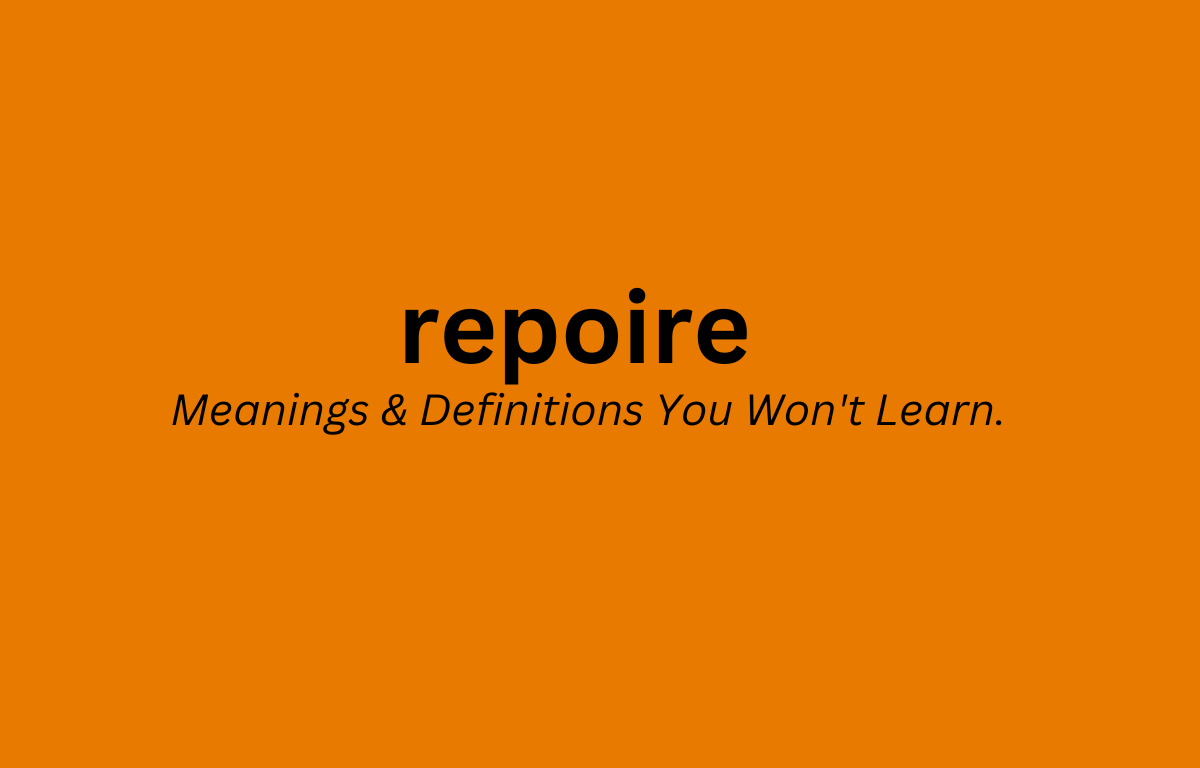Repoire | Meanings & Definitions You Won’t Learn.
Introduction
One key idea is essential to developing healthy connections in both personal and professional contexts: rapport. However, what is rapport precisely, and why is it so important? In its most basic form, rapport is an amicable relationship between individuals that is characterized by respect and understanding. It’s the magic component that turns little exchanges into deep and lasting relationships. Building rapport may improve your ability to communicate effectively, add enjoyment to your conversations, and open the door to more meaningful, in-depth connections. Now let’s go into the intricacies of rapport, examine its advantages, and discover how to establish and preserve it successfully.
Understanding repoire
The process of building a relationship with someone in which both feel at ease and understood is known as rapport. Finding common ground and fostering trust are key to fostering an atmosphere where communication is easy and unrestricted. A deeper connection may be made between people through rapport, whether in an informal chat or a professional meeting. Mutual respect and empathy are fostered by this relationship, which facilitates easier and more pleasurable encounters. In essence, rapport fosters a sense of appreciation and belonging by converting a straightforward verbal interaction into a meaningful conversation.
The Psychology Behind Rapport
The concept of synchronization is the foundation of rapport psychology. When two individuals are in sync, their ideas, feelings, and actions coincide. Interactions become more seamless and pleasurable as a result of this synchronization, which promotes a sense of mutual understanding and connection. According to psychological study, this alignment forges a subconscious connection that strengthens emotions of collaboration and trust. Furthermore, research on neuroimaging has demonstrated that synchronization of brain activity patterns occurs between individuals in repoire, strengthening the bond between them. Gaining an understanding of these psychological processes can assist us in creating more potent plans for establishing and sustaining rapport in a variety of settings.
Benefits of Building repoire
Effective communication increases with repoire-building. There are fewer misunderstandings and better, more fruitful interactions when both sides feel heard and understood. Improved communication facilitates deeper conversations in which thoughts and emotions are openly expressed without concern about criticism. In both personal and professional contexts, this open communication is essential for solving problems quickly and cooperatively. Furthermore, rapport-building and good communication may greatly minimize conflict because they increase the likelihood that both sides will approach conversations with empathy and a desire to hear each other out.
Increased Trust and Cooperation
The basis of trust is repoire. In both personal and professional contexts, people are more inclined to cooperate and work together when they have mutual trust. This trust creates a secure atmosphere in which people feel free to express themselves honestly. Building rapport and trust at work may result in more cohesive teams and higher productivity. It improves emotional stability and tenderness in interpersonal interactions. Furthermore, because people feel accountable and devoted to achieving common objectives, trust lessens the need for continual supervision and micromanagement. In the end, repoire-based trust has the power to change relationships, adding resilience and vibrancy.
Improved Personal and Professional Relationships
Relationships are stronger when there is a good connection. In one’s personal life, it can strengthen friendships and ties to family. It can enhance client connections and team chemistry at work. greater connections lead to greater support networks where people are treated with respect and feel appreciated. This may be translated into a more favorable company culture, lower turnover, and more work satisfaction in a professional setting. It can result in more emotional support, enjoyment, and a sense of belonging in interpersonal connections. Thus, developing and sustaining repoire becomes essential to fostering lasting and satisfying connections.
Elements of repoire
When both people are paying attention to each other, the interaction is completely engaged. This level of interaction conveys that the discussion is vital and that each individual matters to the other. Each participant must actively listen to the speaker without allowing any outside distractions to distract them. Nonverbal indicators of interest and comprehension, such as eye contact, nodding, and suitable facial expressions, are also included in the concept of mutual attention. This degree of involvement contributes to the development of a sincere and encouraging relationship. People may promote deeper, more meaningful encounters that strengthen repoire by putting mutual attention first.
Mirroring and Matching
Mirroring entails softly imitating the motions, speaking patterns, and body language of the other person. This method has the ability to subtly foster a feeling of connection and resemblance. For instance, you could lean forward if the person you’re conversing with does. It might also help them feel more at ease and understood if you match their speaking rate and tone. It’s crucial to employ mirroring and matching subtly and organically, though, since being too apparent might come off as manipulative or dishonest. When used properly, this method creates harmony and repoire, which improves the flow and cohesiveness of encounters.
Finding Common Ground
Establishing common ground via hobbies or life experiences may foster repoire fast. It provides you something to bond around and fosters a sense of camaraderie. Anything from similar principles and aspirations to interests and hobbies can be considered common ground. You may establish an authentic and relatable relationship by concentrating on these commonalities. Deeper discussions and understanding between people can also begin with this common ground. Establishing common ground facilitates the removal of obstacles and fosters trust, improving the quality and significance of encounters.
Apps and Tools
You may use apps and other resources, such empathy exercises, conversation starters, and active listening techniques, to help you establish repoire. Utilizing apps such as “Evernote” and “BetterUp” can help you stay organized and sharpen your communication abilities. These resources offer helpful activities and advice for improving interpersonal communication skills. Additionally, they may provide progress tracking and customized feedback, which will enable you to keep enhancing your rapport-building abilities. People may improve their connections and create deeper, more meaningful relationships by making use of these tools.
Conclusion
The ability to establish repoire is crucial and may change both your personal and professional relationships. You may establish deep relationships that promote mutual respect, trust, and collaboration by comprehending its components, putting effective strategies to use, and getting beyond any obstacles. Recall that the work you do now to establish repoire will pay off later on, strengthening your bonds and improving your exchanges. Focusing on repoire may help you accomplish your goals, whether they want to enhance communication, establish trust, or foster a good workplace. Although developing rapport takes time, effort, and practice, you may become an expert at this vital skill and improve many facets of your life.
FAQs
What is the quickest way to build repoire?
The quickest way to build repoire is through active listening and showing genuine interest in the other person’s thoughts and feelings. Simple gestures like maintaining eye contact and smiling can also make a significant impact. Additionally, finding common ground and expressing empathy can accelerate the process of establishing a connection. By being present and attentive, you can quickly create a sense of trust and understanding.
How can I build rapport with a difficult person?
Building repoire with a difficult person requires patience and empathy. Try to understand their perspective, show respect, and find common ground. Avoid confrontational approaches and focus on positive interactions. It may also help to remain calm and composed, addressing issues with sensitivity and tact. By demonstrating empathy and understanding, you can gradually break down barriers and build a connection, even with challenging individuals.
Can rapport be built online?
Yes, repoire can be built online. Using video calls, engaging in active listening, and showing genuine interest in the other person’s needs and concerns can help build a strong connection, even virtually. Online communication tools, such as instant messaging and emails, can also facilitate repoire if used effectively. Personalizing your communication and maintaining regular contact are key strategies for building repoire in a virtual environment. By leveraging technology and demonstrating genuine interest, you can create meaningful connections online.
What are common mistakes when trying to build repoire?
Common mistakes include being insincere, dominating the conversation, not listening actively, and failing to find common ground. Avoiding these pitfalls can help establish better rapport. It’s also important to be mindful of non-verbal cues and to respect the other person’s boundaries. Overstepping or being overly familiar too soon can hinder the process of building repoire. By approaching interactions with sincerity, empathy, and respect, you can avoid common mistakes and foster stronger connections.
How can I maintain rapport over time?
Maintaining rapport requires consistent effort. Keep the communication lines open, show appreciation, and continue to invest time and interest in the relationship. Regular check-ins and positive interactions are key to sustaining rapport. It’s also important to address conflicts promptly and constructively, ensuring that issues do not fester. By showing ongoing interest and support, you can maintain rapport and strengthen your relationships over time. Consistency, respect, and genuine care are essential for sustaining long-term rapport.




